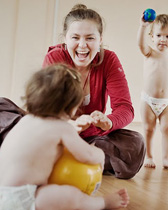|
|
|
|

Alfiya Rakhmanova
|
This is a workshop for kids from 5-year-old and adults who are interested to play and dance with us (parents or festival participants).
In the workshop we will get to know each other, to be sure with who we will dance, play and communicate. I believe that everyone is born already being able to dance! Some o us just forgot a bit what it means. We will revise it together and learn from each other.
I will offer many simple creative tasks, which will help us to find out:
Do we always dance standing on our feet? How movements are created? Can I through improving my dance learn to communicate better, become more confident, more attentive to others? What do I prefer – to lead or to follow? What qualities can I learn from dance? What do I like more – to create something by myself or in couple or in the group? Can we talk without words, only with movement? Can objects inspire our dance? Do adults know how to play?
I like to combine different arts together. Besides movement we will draw, sound, create stories together.
We will follow some important rules:
• Everyone is equally important, one’s thoughts, opinions, emotions of every participants matter.
• Safety rule – safety of oneself, of partners, of space.
• No judgments – we won’t have anything right or wrong, good or bad, interesting or not interesting.
Now I am a student again, I learn two new amazing professions – dance-movement therapist and perinatal psychologist.
Also, I’m a mom. My son is three and he inspired me to work with babies, kids and adults. My son often asks me to take him with me: “Mom, take me with you. I want to go to work with you, because you play and dance there”. Together with Olga Zotova we created we created a form of dance for all the family – BabyContact. We invented it and now we develop the form.
13 years ago when I studied at the university, I started to facilitate groups and workshops for children. We played, danced and talked the whole days long and dance-movement practice was the most exciting part of the work. Then, for a long time I worked as a teacher in the university and danced for myself. And now I dance again with families and kids. Several times a week I teach classes for mothers and babies, and I also work with children with disabilities. One magic woman Emilia once said that this work should be joyful and I completely agree.
|
|
|
|
festival program
|
|
July 9-12 - Workshop
for beginners and all levels with
Benno Voorham;
July 9-12 - Workshop
for beginners and all levels with
Manuela Blanchard;
July 16th - Teachers performance and the festival project in Moscow Theatre;
July 17 - 24 - Main part of The Festival
8 days of dancing in the countryside;
July 27 - 31 - Contact-tango Workshop
for all levels with Leilani Weis;
|
INTENSIVES
The longest and the most important workshops at the festival. Four teachers do their classes separately during five days. On 19, 20, 23 and 24th of July intensives begin at 9.30, on 21st they start at 1330.
CI CLASSES
On 19, 20 and 23rd of July we have Contact Improvisation workshops/classes. They start at 1430.
PERFORMANCE RESEARCH labs
The performance research laboratories are meant to become a basis and tool for participants who want to take on the opportunity to perform at the two performances that are happening at the festival site. A lab can be the chance to carry out one small project with a constant group of people or to investigate different themes around performance each day. You can participate in laboratories one or more days.
We would like to create the freedom for the participants to develop ideas and find ways to use them in performance. We want to invite everybody, participating in the festival, students as well as teachers, to propose their ideas and questions for a performance research lab. Ideas could contain how improvisational forms and contact improvisation are a performance art. Including possible themes like trio, site specific, spontaneous composition, how do we communicate within an improvised piece, working with props, the use of voice, sound, music, texts/poetry, relationship to choreography...
These labs can happen only once or continue for several days, depending on demand. People, who feel confident about facilitating group work and enjoy it, are welcome to offer themselves as facilitators, even if they don’t have a personal performance research theme that they want to investigate.
Labs will start on the first day of the festival. Themes will be chosen from a pool of ideas and questions about improvisation and performance, proposed to us in advance before the festival. We will create a system (i.e. blackboard) for this pool to be added to, so that ideas that come up during the festival can be included in the labs, by a new timetable each day.
ONE-2-ONE SESSIONS
These are 20 min long individual sessions with teachers. In the begining of the festival there will be list of teachers and time where you can write your name to reserve this time for your lesson.
Underscore
An introduction to the Underscore, a long jamming/contact/improvisation score that Nancy has been developing since 1990. The Underscore guides us through a progression of “changing states” of body and mind—from solo sensitizing to gravity and support, into group circulation and contact improvisation engagements, opening out into whole-room compositional awareness and interaction, and back to rest and reflection.
“The Underscore talk” (required for participation in the practice) will give some background and will outline the structure in detail. After this concentrated instruction on the nature of the Underscore, participants will be ready for the physical practice itself, which will include periods of silence and periods of live music improvised/composed by Mike Vargas.
|





